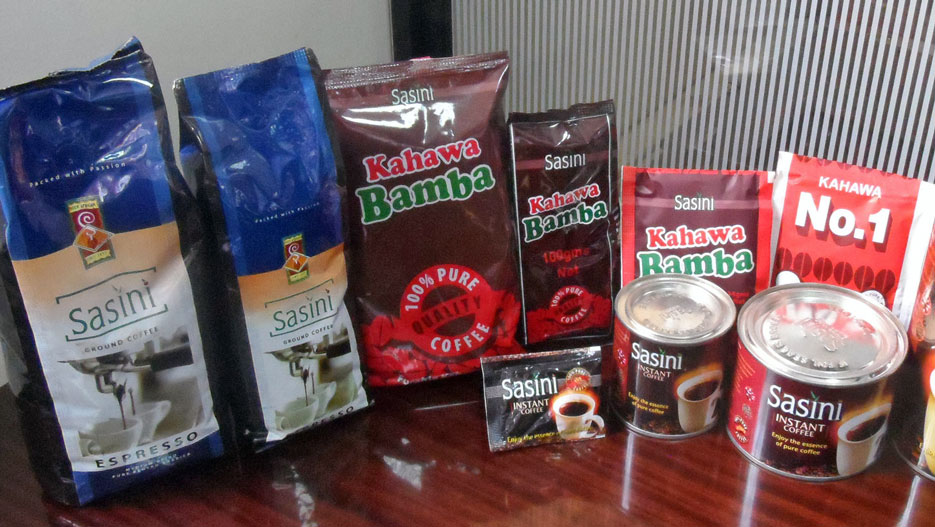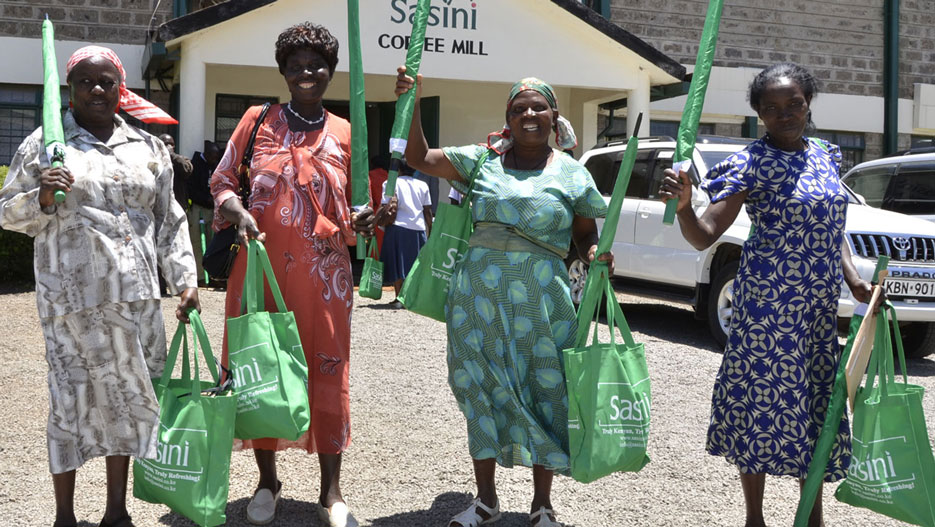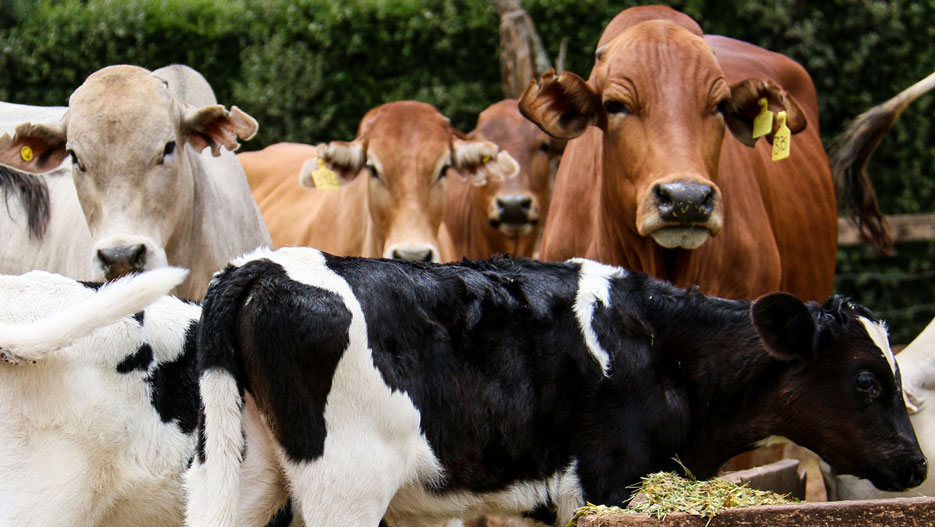Moses Changwony Presents Sasini: A Major Tea and Coffee Producer in Kenya
Moses Changwony gives his assessment of the agribusiness sector in Kenya and presents Sasini, one of the country’s major tea and coffee producers. He also talks about Sasini’s philosophy, what makes them different from the competition, success stories, CSR, challenges, possible partnerships and their plans for the future.
Interview with Moses Changwony, Group Managing Director at Sasini
What is your assessment of the agribusiness sector in Kenya as a whole?
Kenya has an agro-based economy. Agriculture contributes to about twenty five percent of Kenya’s GDP and supports over eighty percent of all rural jobs. It is a very important sector. Unfortunately for us, most of the sector is still in a formative stage of production. We look forward to a time when this can be industrialized, particularly at our production location.
What is the history of your company?
In the sectors that we play in at the moment, we have cut a niche for ourselves. We have kept our standards benchmarked with the best international practice. That is where we draw strength.
It is a long and quiet history. Sasini began operation in 1952. Initially, the company was owned by white settlers who came to this country, then known as the Kenya Colony, in the very early stages of the colonization of Africa. Over time, the company changed hands from the white settlers to significantly local shareholding. We are a publicly quoted company on the Nairobi Securities Exchange. We have about 8,000 shareholders today, most of whom are local and small scale farmers, with the majority of those at the top being Kenyan businessmen. The initial engagement for Sasini was the growing of coffee. We eventually invested in tea, as well. We are now trying to diversify into other sectors of agriculture, such as livestock. We have also expressed interest in horticulture. Over time, we have evolved to the level that we now have a large mill that mills and markets our coffee. This is a recent addition to the business that was brought in only five to ten years ago. We have been growing greatly over the years, and are much bigger now than when we first began business.

How would you describe Sasini’s philosophy and what makes you different from the competition?
We operate on just under 2,000 hectares of coffee plantation. We support about 200,000 small scale farmers whose coffee we process in our factory and market at the same time. Out of all Kenyan coffee, which stands at about 50,000 tons in total, we handle about twenty-two percent. This is spread out between ten marketers, some of whom are foreign owned interest. Kenyan coffee is grown in the most unique elevations and locations along tropical Africa. Kenyan coffee is quite unique compared to Colombian, Brazilian, Tanzanian, or Ugandan coffee. Our quality profile is much higher in our layers and the general taste, and the fact that our coffee is Arabica. We are within a region that has very unique coffee profiles and that puts us on top.
Sasini is involved in many different segments, including tea, coffee, and livestock. Could you go into more detail on those segments?
Tea in Kenya is grown in two locations that we have subdivided into East of Rift and West of Rift. East of Rift is on the Mount Kenya side, which is where we have our coffee plantations, and West of Rift refers to the West of Kenya, around Kericho and Sotik, and is where we grow our tea. On our farm in Sotik, we have 7,000 acres of land. Tea is grown on 2,000 acres and the rest is used for conservation and forestry for firewood. Many farms in the area have switched to mechanized harvesting, but in our estates all of our tea is handpicked by workers, and that makes us unique. This means that we can pick the right side of the tea and the damage to the leaves is minimal compared to those companies that use machine harvesting. We manufacture 11.5 million kilos of tea every year. Most of this tea is sold out of the Mombasa tea auction, which is one of the four tea auctions around the world. We ship the majority of our manufactured tea into Mombasa where it is sold to buyers who buy globally. Most of the tea that goes to the UK is through private contracts and direct sales through Taylors of Harrogate and other tea blenders in this region.
The livestock enterprise was developed to assist in improving our value proposition with our coffee and tea out growers. It is a very small component of our operation at the moment, but it is an area that we want to expand significantly. The current focus is around breeding. We are trying to develop some of the best breeds available in Kenya. We are at the top of the Kenyan start book on Holstein Friesian breeds. We have some of the best genotypes in this country. We want to scale up from there and grow the herd to about 500 milk cows, and from there provide material to our small scale tea and coffee farmers. We are looking at a future where from these genotypes, we can create materials to make available to our tea and coffee farmers so that we can expand their income base.

What are some of Sasini’s most significant success stories?
In the sectors that we play in at the moment, we have cut a niche for ourselves. We have kept our standards benchmarked with the best international practice. That is where we draw strength. Today, we sell much of our coffee to Starbucks and to the best blenders in the world. We have taken all the certifications that are necessary worldwide. Our farms are environmentally sustainable. We have implemented policies to make each of our business operations sustainable by ensuring that we are friendly to the environment and mindful of conservation. Another area of strength is that we have operated this business on very pure business principles. Ethics is an integral part of our management. We pride ourselves on maintaining integrity and trust around our business and in keeping the correct attitude of work among all our workers. That is one strength that many Kenyan companies do not have. For example, my in tray is always empty by the time I leave this office. We do not get called by suppliers because we keep our word. If our credit terms with a client are thirty days, we make sure we have paid them within that period. We do not have suppliers calling the Managing Director’s office looking for payment. We also procure very objectively and we always make sure that we keep our contracts. You don’t find this in many companies. We are very proud of this.
Is your company involved in CSR activities?
We are very committed to CSR. We support a number of primary schools that are located near our businesses. In our tea estate in Kericho, we have just completed a full-fledged secondary school from Form One to Form Four, complete with a laboratory. It will be ready to receive the first students next year. This was financed in full by us. We spent about 40 million Kenyan shillings to bring this to the level that it is today, and we will continue to support it. Nurseries in all our estates raise tree seedlings that we distribute to neighboring schools every year to ensure that our environment continues to be sustainable. We also support our farmers with improved coffee seedlings. Every year we have a selected group of farmers that benefit from seedlings of coffee trees that we have developed in our nurseries. We support technical extension service to assist the farmers in the transfer of knowledge on economy, husbandry issues, and pest control. We have six permanent staff economists based in the different regions where our farmers are located to provide this service free of charge to them. We also occasionally assist a large cooperative by using our facilities to pack their coffee for them in their own brand. They take it back and supply it to their corporative members, which encourages the farmers to drink their own coffee.
What challenges or concerns does your company face?
Kenya is ahead of the rest of the East African countries in the agro industry and agro business. We are quite developed compared to Tanzania, Uganda and the rest of the region. Other than tea and coffee, the major agricultural activity in Kenya is cereal production, mainly wheat and corn. These staples are grown by almost every farmer in our breadbasket area in the western part of Kenya. These raw materials produced by the farmers are not processed on site. It has to be moved outside those provinces into other provinces which results in a great deal of inefficiencies. This is true for milk production as well. Most of it is shipped and processed sometimes over 400 kilometers away from where it is produced. We also ship a lot of vegetables to Europe. The vegetables are grown 300 kilometers away from the factories that package and process them into exportable goods. The producers of these raw materials do not gain any benefit from the added value that comes with processing. We aim to get to a point in which the region producing these products should have all of it processed in and around that area. If these products were processed on site, it would create a trickle down economy effect that would benefit the producers themselves and the sustainability of that production. At the moment, the only value they can capture is the value for the raw material. The majority of the producers do not get as good of a value as the final value of the product. When you look up the value chain, there is more value up there than down here. This is one aspect of our agro industry that needs to be fixed.

What are the main projects you are working on at the moment? What is your strategy for expansion?
We are currently implementing the branded side of our business. It is a fairly new initiative. As soon as we stabilize the base, which is development structure and distribution structure, we want to ensure that thirty percent of our production ends up in the branded side of our business, which is the value addition of our coffee and tea, instead of going into auction. This is being implemented through our retail business side, Sasini Kenya, Ltd. We are currently controlling about one percent of Kenya’s market share. Our strategy is to achieve ten percent by the end of next year. From there, we want to grow to about thirty percent market share. By the time we achieve thirty percent market share, it will consume thirty percent of our factory production. To support this initiative, we have developed the Savannah brand, which is our coffee house initiative. We are now running three shops in town. We want to eventually offload the management to business people, but retain the brand and the supply line for roasted coffee and related products. We will soon be launching the construction of our factory for macadamia nuts. Macadamia nuts are one of the most expensive nuts in the world. We are also looking at processing avocado. We will have significant strength here because of the outreach we have through our out growers, the farmers that grow coffee and tea for us. We want to encourage them to grow these new crops as well. We hope this will improve our revenue side and also improve our relationship with the farmers by expanding potential income base. This will also stabilize their livelihood, particularly when prices of coffee are affected. Brazil is always responsible for driving the coffee prices. When they have a drought issue, we are laughing here in Africa because the prices go up. When they have a good harvest, then our prices plummet. It affects everyone.
Are you looking for any type of partners or investors?
We are definitely interested in strategic partnerships, particularly those that create market linkages. Recently we have engaged in a strategic partnership with Wilson Coffee of Finland. This coffee was developed and blended by Sasini and also shipped by us. It is the first hundred percent Kenyan ground coffee available in Europe. We hope to continue to grow in that area. We would be interested in such partnerships even as we build our capacity on macadamia nuts. If we can find investors that want to work with us on this, we will be very open to discussion.
Why should those potential investors do business with you?
All potential investors looking at Sasini can trust their investment in us. We are very professional. We run our business through very structured processes. The board holds management meetings on a monthly basis to review our performances. We always push ourselves to meet and surpass our targets. Investing with us would draw in a lot of that value, and also draw a lot of value in Sasini being in this trade for as long as 1952. Today, we run our business on cash flows. We have always managed our cash flows professionally and managed to sustain our business without having to borrow from the bank. It is going to be a solid investment. They can also invest in our share. We are quoted in the Nairobi Securities Exchange. For long term investors, this will be something to consider. Being an agriculture based business, short term investment may not be ideal. I can assure you that we spend all our hours when we are in this office making sure that that investment is safe.

Why should people consider Kenya as a business and investment destination?
Kenya brings access to the entire COMESA fraternity, which is a huge market. That is an opportunity to attack all those markets from one place. You would be in the right place if you want to sell to Egypt, South Africa, Zambia, Malawi, Ethiopia, or Uganda. Nairobi is a hub, we have an international airport connecting to about two hundred destinations very easily. Kenya has issues around our election time, but when you look at Kenya in the mirror of Africa, our politics have been very stable. Politically, you can trust us. We have not had presidents who want to extend their terms beyond what is stipulated in the Constitution. You can be sure that every two terms, we will have elections and a new president will come in. At least from that side we can be predictable. Immediately after the elections we get back to work and we reach our goals. We also have a very stable economy. The economy of Kenya defied the slowdown in Europe, China and America. Given what has happened the last three years in these major economies, in Kenya, it did not have any serious effect. We still grow about 5.4 or 5.3 percent every year. It is one of those destinations that you can be proud to put your money into. The last three years, we have also led the region in foreign direct investment. In fact, there is indication that we could easily overtake South Africa in terms of FDIs. Kenya is a very good destination to think about investing in. It is also a lovely country. We have temperatures at 23 degrees Celsius throughout the year. We don’t have extremes of summer and winter like in Europe. If you would like to be a bit hot you can go to Mombasa. For winter weather you can visit Mount Kenya. It is an interesting place to be.